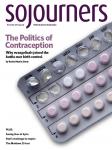NOT LONG AGO, a friend asked my opinion about birth control pills. She and her husband, who have several young children, wanted to use them, but she had misgivings.
She had read an article by a Christian couple that had frightened her. “They basically just blasted the entire idea of using hormonal birth control on the basis that it is pretty much abortion,” she said.
Although evangelical sex manuals from the 1970s, including Ed and Gaye Wheat’s Intended for Pleasure, advocated the pill as a means of enjoying the delights of the marital bed without fear of pregnancy, some evangelicals today have a very different perspective. A recent Christianity Today blog series on contraception that I participated in received vigorous and occasionally vitriolic responses, despite giving voice to a range of perspectives: Advocates of hormonal contraception were featured alongside proponents of natural family planning.
How is it that contraception has become a religious battlefield—even, or perhaps especially—among evangelical Protestants?
A certain myth currently in circulation among conservative Christians (Catholic and evangelical alike) harkens back to a pre-contraceptive past when parents welcomed innumerable children, each as a gift from God. In this mythical narrative, the advent in the 1960s of the modern contraceptive pill fostered in people a “hedonistic mentality” and made them “unwilling to accept responsibility in matters of sexuality.” After the pill, children were no longer seen as gifts, but as burdens—“diseases” to be vaccinated against. If, despite precautionary measures, a woman conceived, then her modern “contraceptive mentality” would all but determine that she have an abortion. “Abortion becomes the only possible decisive response to failed contraception,” wrote Pope John Paul II in his 1995 encyclical Evangelium Vitae.
Echoing Evangelium Vitae, in 2006 Southern Baptist leader Al Mohler called for the “rejection of the contraceptive mentality that sees pregnancy and children as impositions to be avoided rather than as gifts to be received, loved, and nurtured.” He also charged that the “effective separation of sex from procreation” was “one of the most ominous” and “important defining marks of our age,” leading to all kinds of sexual degradation.
The implication, of course, is that earlier ages were more closely aligned with God’s will and with “natural law,” the classical philosophy praised by Pope Paul VI in his 1968 encyclical Humanae Vitae.
According to Catholic teaching, marital intercourse should be “unitive” and “procreative”—both strengthening the couple and producing children. To separate these two roles is a sin. But 50 years ago, the Catholic Church almost changed its teaching. A papal commission was charged with examining population growth, the family, and children. It included scientists and Protestant theologians as well as practicing Catholics who shared stories of “women worn out by multiple pregnancies, medical problems, and the financial burdens of raising large families.” The commission was nearly unanimous in its recommendation to the pope that the ban on contraception be lifted. However, three dissenting bishops met privately with the pope and convinced him that overturning the ban would undermine church authority. And so the ban remains, though it is largely ignored by the laity.
Linda Gordon is a historian who has studied the social history of birth control. “Every known human society tried to practice some kind of reproductive control,” says Gordon. As to the claim that people in a halcyon, pre-technological age welcomed the fruits of their sexual union more eagerly and joyfully than moderns, who regard them as impositions, “that’s just wrong,” according to Gordon.
It is true that larger families were and are more desirable in agricultural societies, especially in times and places in which disease regularly took—and takes—infants’ and children’s lives. But in the early 20th century, among the working urban poor in New York City, for example, large families were an economic liability.
Neither were marriages necessarily “happier” or more open, self-sacrificing, and fruitful in earlier eras. One has only to look a little way into the history of contraception to see this claim’s patent hollowness.
In the U.S., letters between the 19th century abolitionist author Harriet Beecher Stowe and her husband, Calvin Stowe, attest to the difficulty of marital abstinence. The couple repeatedly experimented with living apart so as to space pregnancies; the couple eventually had seven children. In one letter Calvin, a seminary professor, tells Harriet that having a male friend spend the lonely nights cuddling with him in bed was a great comfort in her absence: “He puts his arms around me and hugs me to my hearts’ [sic] content.” Other letters express what must have been considerable sexual frustration. To one of her many siblings, Harriet writes with irritation of the tedious and demanding labor of frequent childbearing, childcare, and nursing.
Beyond talking points
What about the so-called “contraceptive mentality” leading to a culture of abortion, as indicated by Pope John Paul II?
Historically speaking, in the 1890s, when birth control was illegal in the U.S., doctors estimated that 2 million abortions were performed each year out of a population of 64 million people. In 2011, the CDC recorded 730,322 legal induced abortions out of a population of more than 300 million. The claim that abortion is a consequence of contraception or a “contraceptive mentality” isn’t merely tenuous: It’s wrong.
Still, some vigorously deny the utility of contraceptives in reducing abortion. Steven Ertelt, editor of LifeNews.com, wrote to me, “Contraception has not drastically reduced the number of abortions. Studies show that pro-life laws that provide women with alternatives, ban abortions, or defund them do more to lower the number of abortions.”
“The leaders of political movements and conservative churches are refusing to look beyond talking points,” said Dr. Colleen McNicholas, an obstetrician-gynecologist and an assistant professor and researcher at the medical school of Washington University in St. Louis. In a study there, McNicholas and her colleagues found that offering free contraception to women—most of whom were poor and uninsured—significantly lowered rates of teen pregnancy and of abortion.
“Greater contraceptive access should not be a matter of debate,” McNicholas’ colleague, Dr. Jeffrey Peipert, told me. “Providing access, education, and no-cost contraception can drastically reduce unintended pregnancy and abortion. To claim otherwise is to completely dismiss evidence-based health care.”
If a majority of Catholic and evangelical women in the U.S. use “highly effective” methods of contraception, as studies indicate, and if free access to these methods reduce abortion, then why have Christian conservatives opposed the contraceptive mandate of the Affordable Care Act?
The answer rests on a blend of political strategy that includes conflating abortion and contraception while advancing a particular definition of religious liberty that, in the spirit of Citizens United, allows corporations to have “religious consciences.”
Catholic bishops and conservative evangelicals opposed the mandate. Although churches and houses of worship that object to contraception were already exempted, faith-based nonprofits such as hospitals and universities were not. When it was argued that the ACA mandate infringed on religious freedom, President Obama offered a compromise.
But the opposition—seemingly motivated more by partisan politics than by theology or even religious liberty—continued. In Burwell v. Hobby Lobby, the Supreme Court found that even certain for-profit companies can claim exemption from the contraceptive mandate if the owners believe that providing birth control violates their beliefs. At the center of Hobby Lobby’s case were a handful of highly effective contraceptives, including some formulations of the pill, emergency contraceptives, and IUDs, which the Hobby Lobby owners claimed caused abortions.
Conservative political figures, including Sen. Ted Cruz, Mitt Romney, Newt Gingrich, and Rick Santorum, have all insisted that hormonal contraception, particularly Plan B, cause a kind of abortion by preventing the implantation of a fertilized egg on a woman’s uterine wall. This is disputed by much of the scientific and medical community, as well as some pro-life Catholic and conservative Protestant ethicists.
McNicholas said that the possibility of certain forms of birth control preventing a fertilized egg from implanting are very, very slight. “The pill and Depo-Provera [a contraceptive injection] are forms of hormone that are made by our body naturally and work by suppressing ovulation,” she said. Their primary function is to prevent an egg from being available to be fertilized in the first place, as well as preventing the fertized egg from implanting in the uterus.
McNicholas described this discussion as “get[ting] into the weeds a little bit,” affirming that “matters of faith or personal belief (particularly when they are incongruent with medical facts) should only guide the medical care of the individual who holds such a belief”—not public policy.
Nonetheless, whether by labeling certain highly effective methods of birth control as “abortifacient” or by ruefully reflecting on the supposedly innovative and deleterious “contraceptive mentality,” conservative politicians, their strategists, and religious allies have galvanized opposition to President Obama’s signature legislation.
I talked with Jenell Paris, a professor of anthropology at Messiah College, who has thought and written carefully about birth control for decades. “I think there is a moral difference between a uterus (theoretically) rejecting a fertilized egg and ending an established pregnancy.” Paris says she has talked with many women who have cried about the “abortions” they worry that the pill may have caused—women, she said, who have been “consumed with guilt and convinced that they had killed dozens of babies.” Given that we know that hormonal birth control never works primarily by inhibiting implantation and that its purported “abortifacient” qualities are debated and theoretical, Paris said, “we have to think about the consequences of our theology, and this is not humane theology.”
Paris, who teaches college students, says she’s known well-intended young evangelicals who, not wanting to fall prey to the “contraceptive mentality,” have “too many children too young, and realize that their beliefs are not permitting them to have a healthy adulthood or a healthy marriage—it can undermine everything they thought they knew about God.”
Top-down theology?
Despite vocal opposition to the ACA’s contraceptive mandate by some evangelicals, other evangelical leaders are increasingly willing to support contraception and family-planning education for women in developing nations. Hope Through Healing Hands, an organization galvanizing faith-based support for such efforts, sent a letter last year to Congress, signed by more than 60 prominent evangelicals, articulating the hope that Congress would prioritize funding for USAID’s global maternal health program. “When women and girls lack access to the education and resources they need to create a healthy plan for becoming mothers,” they wrote, “the result is tragic: 287,000 women in developing nations die from preventable complications during childbirth, and 6.6 million children die before their fifth birthday each year.”
Why would Americans of faith eagerly lend support to USAID-funded family planning programs that include contraceptive distribution while opposing efforts that would make contraceptives more accessible and affordable for women in the U.S.—particularly if some allege contraceptives create a culture that’s hostile to children and families? Perhaps it is because contexts in which people live in extreme poverty and women bear unlimited numbers of children are clearly not the idealized societies of a certain nostalgic vision of the pre-technological past. On the contrary: Family planning—particularly the highly effective methods—helps stave off the gravest suffering and death of women and children in the most vulnerable areas of the earth.
When Christians speak to these issues publicly, they too often speak from positions of privilege. Top-down theology, like top-down politics, always seems to miss the lived experiences of ordinary people. Men have too often controlled the arguments surrounding contraception—how else could three Catholic bishops manage to persuade the pope to ignore the decision of a much larger and more diverse papal commission?
We know that contraception has the potential to do all sorts of good in the world: to help prevent maternal death, to help prevent infanticide and infant mortality and morbidity, to help prevent abortion. Contraception allows people to have healthy families and to make decisions for the wise stewardship of the resources of our fragile earth. Fertility is a blessing, but so is sex: the “procreative” and “unitive” in harmony, rather than lockstep.
Whatever the Song of Songs may be about, it is also about the delights of sex—with nary a baby in sight. In his letter to the Corinthians, Paul commends marriage not for procreation, but for sexual continence, so that people will not be consumed with uncontainable passions. And throughout the New Testament, the concept of “fruitfulness” (associated in the Hebrew Bible with literal children) refers to making disciples and living into Jesus’ kingdom ethic—not to making babies.
And perhaps that, finally, is the story that Christians today should aspire to live within—not some historical fiction about a world that was more welcoming to babies because it lacked the means to prevent their conception, but a world where wisdom and knowledge serve the causes of justice, mercy, and human flourishing.
This article was amended from the print version to correct the reference to Burwell v. Hobby Lobby.

Got something to say about what you're reading? We value your feedback!

